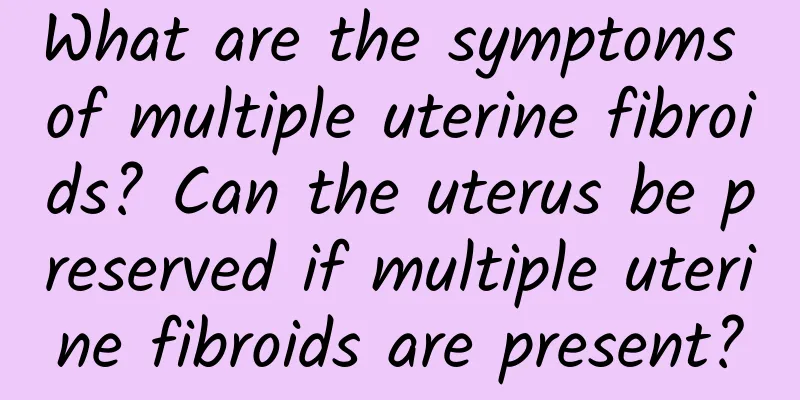What are the symptoms of multiple uterine fibroids? Can the uterus be preserved if multiple uterine fibroids are present?

|
Can the uterus be preserved in patients with multiple uterine fibroids? Uterine fibroids are the most common benign tumors in the female reproductive organs. Since uterine fibroids are mainly formed by the proliferation of uterine smooth muscle cells, with a small amount of fibrous connective tissue as supporting tissue, it is more accurate to call them uterine leiomyomas. Uterine fibroids are the most common benign tumors in the female reproductive system, mainly occurring in women aged 35 to 50. Symptoms of uterine fibroids (1) Uterine bleeding is the main symptom of uterine fibroids, occurring in more than half of patients. (2) Abdominal mass and compression symptoms Myoma gradually grows. When the uterus is enlarged for more than 3 months or a large subserosal myoma is located at the bottom of the uterus, the abdominal mass can usually be felt and is more obvious in the morning. (3) Pain: Generally, uterine fibroids do not cause pain, but many patients may experience lower abdominal distension and back pain. (4) Increase the uterine cavity, increase the endometrial glands, increase pelvic congestion, and increase leucorrhea (5) Infertility and miscarriage Some patients with uterine fibroids experience infertility or are prone to miscarriage. The impact on conception and pregnancy outcomes may be related to the growth location, size and number of the fibroids. (6) Anemia: Long-term menorrhagia or irregular vaginal bleeding may cause hemorrhagic anemia. Patients with submucosal fibroids often suffer from severe anemia. Uterine fibroids examination 1. Ultrasound examination It is currently the most commonly used auxiliary diagnostic method. It can show the enlargement of the uterus, irregular shape, the number, location, size of fibroids, and whether the interior of the fibroids is uniform or liquefied, cystic, etc. Ultrasound examination is not only helpful in diagnosing uterine fibroids, but also helps to identify ovarian tumors or other pelvic masses. 2. Diagnostic curettage Detect the size and direction of the uterine cavity, feel the shape of the uterine cavity, and understand whether there is a mass in the uterine cavity and its location. Patients with abnormal uterine bleeding usually need to identify endometrial lesions, and diagnostic curettage is of great value. 3. Hysteroscopy The morphology of the uterine cavity and the absence of vegetation can be directly observed under hysteroscopy, which helps in the diagnosis of submucosal fibroids. 4. Laparoscopy When fibroids must be differentiated from ovarian tumors or other pelvic masses, laparoscopy can directly observe the size, shape, and growth location of the uterus and preliminarily determine its nature. 5. Magnetic resonance imaging Generally speaking, there is no MRI examination. If it is necessary to identify whether it is uterine fibroids or uterine sarcoma, MRI, especially enhanced delayed imaging, can help identify uterine fibroids and uterine sarcoma. Before laparoscopic surgery, MRI examination can also help clinicians understand the location of fibroids before and during surgery and reduce residual. |
<<: What are the causes and symptoms of multiple uterine fibroids?
>>: What are the symptoms of multiple uterine fibroids? How to treat multiple uterine fibroids?
Recommend
Postoperative care for congenital absence of vagina
There are many surgical treatments for congenital...
How to prevent endometrial tuberculosis
Since endometrial tuberculosis often occurs after...
What are the health care methods for ovarian cysts?
What are the health care methods for ovarian cyst...
Unhealthy sex life is also a cause of uterine fibroids
Normal sex life is helpful to women's health,...
What are the clinical manifestations of chronic cervicitis? Can I get HPV vaccine if I have chronic cervicitis?
Chronic cervicitis is a gynecological disease, an...
What is the treatment for chronic pelvic inflammatory disease?
Chronic pelvic inflammatory disease is a chronic ...
What are the symptoms of uterine fibroids during pregnancy? Is the incidence of uterine fibroids during pregnancy high?
What are the symptoms of uterine fibroids during ...
Losing weight is not just about eating the right foods, adjusting the order of your diet is even more critical! Stabilize blood sugar after meals and avoid obesity
If you want to lose weight easily, in addition to...
Symptoms of two main types of vulvar leukoplakia
Many people want to know the symptoms of the two ...
What should I prepare for mountain climbing? Learn to overcome 3 sports injuries first!
"You must climb Mount Yushan once in your li...
Doctors explain the dangers of threatened abortion
Pregnancy is the most important event in a woman&...
What are the symptoms of uterine cysts?
What are the symptoms of uterine cysts? 1. Lower ...
What are the dangers of amenorrhea in girls?
The harm of amenorrhea in adolescent girls. Many ...
Stabilize blood sugar and help lose weight ~ Eat these "stringy" foods wisely
Ingredients such as yam, okra, and fungus all con...
Some professional introduction to the causes of pelvic inflammatory disease
Do you know the cause of pelvic inflammatory dise...









